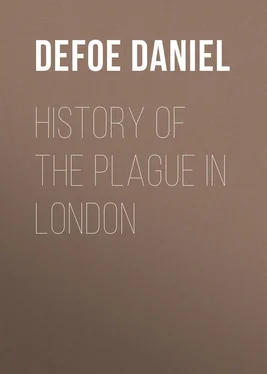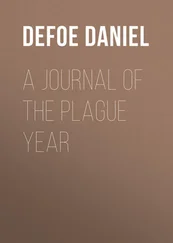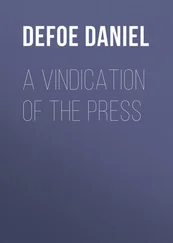Daniel Defoe - History of the Plague in London
Здесь есть возможность читать онлайн «Daniel Defoe - History of the Plague in London» — ознакомительный отрывок электронной книги совершенно бесплатно, а после прочтения отрывка купить полную версию. В некоторых случаях можно слушать аудио, скачать через торрент в формате fb2 и присутствует краткое содержание. Жанр: foreign_antique, foreign_prose, на английском языке. Описание произведения, (предисловие) а так же отзывы посетителей доступны на портале библиотеки ЛибКат.
- Название:History of the Plague in London
- Автор:
- Жанр:
- Год:неизвестен
- ISBN:нет данных
- Рейтинг книги:4 / 5. Голосов: 1
-
Избранное:Добавить в избранное
- Отзывы:
-
Ваша оценка:
- 80
- 1
- 2
- 3
- 4
- 5
History of the Plague in London: краткое содержание, описание и аннотация
Предлагаем к чтению аннотацию, описание, краткое содержание или предисловие (зависит от того, что написал сам автор книги «History of the Plague in London»). Если вы не нашли необходимую информацию о книге — напишите в комментариях, мы постараемся отыскать её.
History of the Plague in London — читать онлайн ознакомительный отрывок
Ниже представлен текст книги, разбитый по страницам. Система сохранения места последней прочитанной страницы, позволяет с удобством читать онлайн бесплатно книгу «History of the Plague in London», без необходимости каждый раз заново искать на чём Вы остановились. Поставьте закладку, и сможете в любой момент перейти на страницу, на которой закончили чтение.
Интервал:
Закладка:
I looked earnestly every way, and at the very moment that this man directed, but could not see the least appearance of anything. But so positive was this poor man that he gave them vapors 53 53 "Gave them vapors," i.e., put them into a state of nervous excitement.
in abundance, and sent them away trembling and frightened, till at length few people that knew of it cared to go through that passage, and hardly anybody by night on any account whatever.
This ghost, as the poor man affirmed, made signs to the houses and to the ground and to the people, plainly intimating (or else they so understanding it) that abundance of people should come to be buried in that churchyard, as indeed happened. But then he saw such aspects I must acknowledge I never believed, nor could I see anything of it myself, though I looked most earnestly to see it if possible.
Some endeavors were used to suppress the printing of such books as terrified the people, and to frighten the dispersers of them, some of whom were taken up, but nothing done in it, as I am informed; the government being unwilling to exasperate the people, who were, as I may say, all out of their wits already.
Neither can I acquit those ministers that in their sermons rather sunk than lifted up the hearts of their hearers. Many of them, I doubt not, did it for the strengthening the resolution of the people, and especially for quickening them to repentance; but it certainly answered not their end, at least not in proportion to the injury it did another way.
One mischief always introduces another. These terrors and apprehensions of the people led them to a thousand weak, foolish, and wicked things, which they wanted not a sort of people really wicked to encourage them to; and this was running about to fortune tellers, cunning men, 54 54 Soothsayers.
and astrologers, to know their fortunes, or, as it is vulgarly expressed, to have their fortunes told them, their nativities 55 55 In astrology, the scheme or figure of the heavens at the moment of a person's birth. From this the astrologers pretended to foretell a man's destiny.
calculated, and the like. And this folly presently made the town swarm with a wicked generation of pretenders to magic, to the "black art," as they called it, and I know not what, nay, to a thousand worse dealings with the devil than they were really guilty of. And this trade grew so open and so generally practiced, that it became common to have signs and inscriptions set up at doors, "Here lives a fortune teller," "Here lives an astrologer," "Here you may have your nativity calculated," and the like; and Friar Bacon's brazen head, 56 56 Roger Bacon, a Franciscan friar of the thirteenth century, had a knowledge of mechanics and optics far in advance of his age: hence he was commonly regarded as a wizard. The brazen head which he manufactured was supposed to assist him in his necromantic feats; it is so introduced by Greene in his play of Friar Bacon and Friar Bungay (1594).
which was the usual sign of these people's dwellings, was to be seen almost in every street, or else the sign of Mother Shipton, 57 57 A fortune teller who lived in the reign of Henry VIII., and was famous for her prophecies.
or of Merlin's 58 58 The most celebrated magician of mediæval times (see Spenser's Faërie Queene and Tennyson's Merlin and Vivien).
head, and the like.
With what blind, absurd, and ridiculous stuff these oracles of the devil pleased and satisfied the people, I really know not; but certain it is, that innumerable attendants crowded about their doors every day: and if but a grave fellow in a velvet jacket, a band, 59 59 Linen collar or ruff.
and a black cloak, which was the habit those quack conjurers generally went in, was but seen in the streets, the people would follow them 60 60 Him.
in crowds, and ask them 60 Him.
questions as they went along.
The case of poor servants was very dismal, as I shall have occasion to mention again by and by; for it was apparent a prodigious number of them would be turned away. And it was so, and of them abundance perished, and particularly those whom these false prophets flattered with hopes that they should be kept in their services, and carried with their masters and mistresses into the country; and had not public charity provided for these poor creatures, whose number was exceeding great (and in all cases of this nature must be so), they would have been in the worst condition of any people in the city.
These things agitated the minds of the common people for many months while the first apprehensions were upon them, and while the plague was not, as I may say, yet broken out. But I must also not forget that the more serious part of the inhabitants behaved after another manner. The government encouraged their devotion, and appointed public prayers, and days of fasting and humiliation, to make public confession of sin, and implore the mercy of God to avert the dreadful judgment which hangs over their heads; and it is not to be expressed with what alacrity the people of all persuasions embraced the occasion, how they flocked to the churches and meetings, and they were all so thronged that there was often no coming near, even to the very doors of the largest churches. Also there were daily prayers appointed morning and evening at several churches, and days of private praying at other places, at all which the people attended, I say, with an uncommon devotion. Several private families, also, as well of one opinion as another, kept family fasts, to which they admitted their near relations only; so that, in a word, those people who were really serious and religious applied themselves in a truly Christian manner to the proper work of repentance and humiliation, as a Christian people ought to do.
Again, the public showed that they would bear their share in these things. The very court, which was then gay and luxurious, put on a face of just concern for the public danger. All the plays and interludes 61 61 The interlude was originally a short, humorous play acted in the midst of a morality play to relieve the tedium of that very tedious performance. From the interlude was developed farce; and from farce, comedy.
which, after the manner of the French court, 62 62 Charles II. and his courtiers, from their long exile in France, brought back to England with them French fashions in literature and in art.
had been set up and began to increase among us, were forbid to act; 63 63 To be acted.
the gaming tables, public dancing rooms, and music houses, which multiplied and began to debauch the manners of the people, were shut up and suppressed; and the jack puddings, 64 64 Buffoons, clowns.
merry-andrews, 64 Buffoons, clowns.
puppet shows, ropedancers, and such like doings, which had bewitched the common people, shut their shops, finding indeed no trade, for the minds of the people were agitated with other things, and a kind of sadness and horror at these things sat upon the countenances even of the common people. Death was before their eyes, and everybody began to think of their graves, not of mirth and diversions.
But even these wholesome reflections, which, rightly managed, would have most happily led the people to fall upon their knees, make confession of their sins, and look up to their merciful Savior for pardon, imploring his compassion on them in such a time of their distress, by which we might have been as a second Nineveh, had a quite contrary extreme in the common people, who, ignorant and stupid in their reflections as they were brutishly wicked and thoughtless before, were now led by their fright to extremes of folly, and, as I said before, that they ran to conjurers and witches and all sorts of deceivers, to know what should become of them, who fed their fears and kept them always alarmed and awake, on purpose to delude them and pick their pockets: so they were as mad upon their running after quacks and mountebanks, and every practicing old woman for medicines and remedies, storing themselves with such multitudes of pills, potions, and preservatives, as they were called, that they not only spent their money, but poisoned themselves beforehand, for fear of the poison of the infection, and prepared their bodies for the plague, instead of preserving them against it. On the other hand, it was incredible, and scarce to be imagined, how the posts of houses and corners of streets were plastered over with doctors' bills, and papers of ignorant fellows quacking and tampering in physic, and inviting people to come to them for remedies, which was generally set off with such flourishes as these; viz., "Infallible preventitive pills against the plague;" "Never-failing preservatives against the infection;" "Sovereign cordials against the corruption of air;" "Exact regulations for the conduct of the body in case of infection;" "Antipestilential pills;" "Incomparable drink against the plague, never found out before;" "An Universal remedy for the plague;" "The Only True plague water;" "The Royal Antidote against all kinds of infection;" and such a number more that I cannot reckon up, and, if I could, would fill a book of themselves to set them down.
Читать дальшеИнтервал:
Закладка:
Похожие книги на «History of the Plague in London»
Представляем Вашему вниманию похожие книги на «History of the Plague in London» списком для выбора. Мы отобрали схожую по названию и смыслу литературу в надежде предоставить читателям больше вариантов отыскать новые, интересные, ещё непрочитанные произведения.
Обсуждение, отзывы о книге «History of the Plague in London» и просто собственные мнения читателей. Оставьте ваши комментарии, напишите, что Вы думаете о произведении, его смысле или главных героях. Укажите что конкретно понравилось, а что нет, и почему Вы так считаете.












